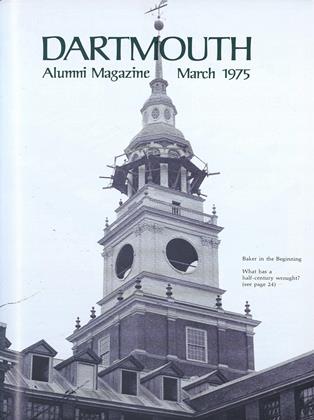At a five-day conference on "Famine 1975," sponsored last month by the Tuck School and the Geography Department for the Dartmouth community and area residents, visiting lecturers and members of the faculty examined the prospects of alleviating hunger in a world of growing populations and proportionately dwindling food supplies.
Co-chairman Robert Huke, Professor of Geography, opened the conference with an overview of current world food problems; co-chairman Wayne Broehl, Tuck Professor of the Science of Administration, closed it with a discussion summarizing the prospects for the years ahead.
In the days between, specialists from business, government, environmental studies, agronomy, organic farming, and political science looked famine in the face. They expressed varying degrees of pessimism and an occasional ray of optimism on the possibility of coping with the widening gap between the numbers of mouths to feed and the food to stay their hunger.
Robert Rodale, editor of OrganicGardening, urged Americans to "create personal food reserves," storing food they produce themselves, and emphasized the need for new high-yielding plants for the home gardener.
William A. Hewitt, chief executive officer of Deere and Company, argued that more people throughout the world were eating better and that modern technology and political intelligence will provide ways to meet future food needs.
Professor Donella Meadows of the Enviromental Studies faculty asserted that nations must choose between the right to feed and the right to breed indiscriminately and urged that surplus U.S. grain go to those who control their population growth and that Americans themselves learn to consume a smaller share of limited resources.
Georg Borgstrom, Michigan State University food science professor, warned that population growth, changing climates, and rapidly approaching ecological and geographical limits demand a drastic change in basic values.
George J. F. Mac Donald, Luce Professor of Environmental Studies and Policy, stressed the need for global grain reserves, especially in view of unpredictable weather patterns which have recently reduced crop yields in important farming areas. He too emphasized the disparity between levels of consumption in America and elsewhere.
Professor Howard Erdman of the Government Department disagreed on geo-political grounds with denying food aid to nations like India unless they curbed their population growth, warning that world conflict could result from a hungry nuclear nation whose neighbors enjoy food surpluses. He predicted that India could wipe out its food deficit with a little help.
Congressman Morris Udall of Arizona, a declared presidential candidate, called for the abandonment of the U.S. policy of direct food aid in favor of an international research effort "comparable in scale and commitment to the Manhattan and Apollo projects," through which, he contended, resources can be found to forestall a worldwide food crisis.
In time of famine, an apt sign in this case in the Fairchild Physical Sciences Center.
 View Full Issue
View Full Issue
More From This Issue
-
 Feature
Feature"He could Have talked Satan into abandoning hell"
March 1975 By MARY BISHOP ROSS -
 Feature
Feature"How Ya Gonna Keep 'Em Down on the Farm?"
March 1975 By ROBERT L. HIER -
 Feature
FeatureAnother Day, Another Dollar
March 1975 By V.F.Z. -
 Feature
FeatureA Renaissance of Slashers and Bashers
March 1975 By SID LEAVITT '62 -
 Article
ArticleOnce forbidden territory to students, The Library(ies)
March 1975 By JAMES L. FARLEY -
 Class Notes
Class Notes1959
March 1975 By DOUGLAS WISE, BARRY R. BLAKE







